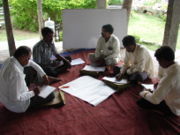Tertiary teaching in New Zealand/Educational culture in New Zealand/What are we moving towards?/Facilitation and experiential learning
| Tertiary teaching in New Zealand | |
|---|---|
| Unit 2: Education culture in New Zealand | |
| What are we moving towards? | Objectives | What is Ako? | Cultural competence | Facilitation and experiential learning | Learner engagement | Summary |
Facilitation and experiential learning
Would you rather be the "Sage on the Stage" or the "Guide on the Side"? We are all familiar with the first one - the expert who stands at the front and gives us wisdom, usually with the help of a Powerpoint presentation! But faciltation is another approach - literally "to help". Teachers may like to be thought of as experts - and in some situations and some topics, this is appropriate. For example, the anatomy of the liver has not changed much for centuries, although our understanding of it has changed. However, in software programming, experts are usually expert in old information! The world of business discovered the value of the facilitator's role long before teachers did, but we are catching up! We are discovering that it is very satisfying to help people learn from each other and from their experiences. In some ways, teachers in primary schools are ahead of tertiary teachers - have a look at this video to see what is happening in many schools.In practice, most learning sessions are a mix of teaching and facilitation. Next time you are present in a learning session, whether as a "teacher" or a "student", or even as an observer, take note of how much time is spent on each activity. After the session, reflect on what could have been done differently and whether the mix was appropriate to the topic and the learners.
The issues of facilitation and experiential learning will be covered extensively in other parts of the Graduate Diploma in Tertiary Education. Here we are merely introducing the concepts. Experiential learning is particularly relevant to vocational education, as experienced in Polytechnics and Technical institutions, but its principles apply to all groups. Experiential learning begins at a very early age, and is the way in which we learn in every situation - except in a traditional classroom! An excellent model of experiential learning was developed by David Kolb, and a clear outline of his theory can be found here.
|
During a teaching observation, record briefly the activities that take place and classify the amount of time that is spent "teaching" and the time devoted to "facilitation". Do you think this split was about right? If not, what could have been done differently? Post your thoughts to the Moodle forum.
|
